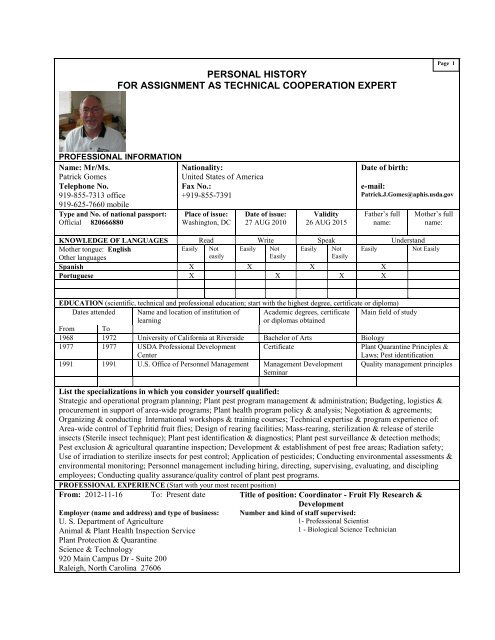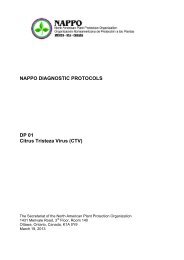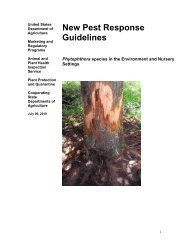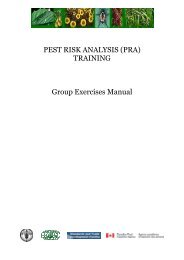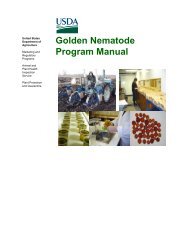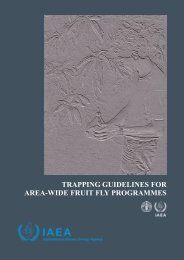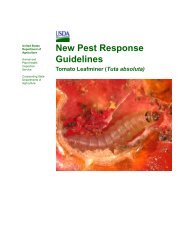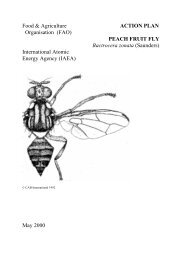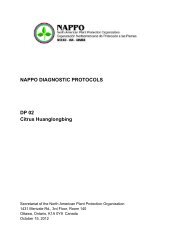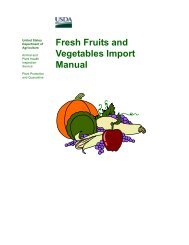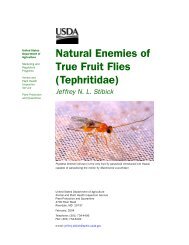2013 P Gomes Personal History.pdf - Phytosanitary Resources
2013 P Gomes Personal History.pdf - Phytosanitary Resources
2013 P Gomes Personal History.pdf - Phytosanitary Resources
Create successful ePaper yourself
Turn your PDF publications into a flip-book with our unique Google optimized e-Paper software.
PERSONAL HISTORY<br />
FOR ASSIGNMENT AS TECHNICAL COOPERATION EXPERT<br />
Page 1<br />
PROFESSIONAL INFORMATION<br />
Name: Mr/Ms.<br />
Nationality:<br />
Patrick <strong>Gomes</strong><br />
United States of America<br />
Telephone No.<br />
Fax No.:<br />
919-855-7313 office<br />
+919-855-7391<br />
919-625-7660 mobile<br />
Type and No. of national passport:<br />
Official 820666880<br />
Place of issue:<br />
Washington, DC<br />
Date of issue:<br />
27 AUG 2010<br />
Validity<br />
26 AUG 2015<br />
Date of birth:<br />
e-mail:<br />
Patrick.J.<strong>Gomes</strong>@aphis.usda.gov<br />
Father’s full<br />
name:<br />
Mother’s full<br />
name:<br />
KNOWLEDGE OF LANGUAGES Read Write Speak Understand<br />
Mother tongue: English<br />
Easily Not Easily Not Easily Not Easily<br />
Not Easily<br />
Other languages<br />
easily<br />
Easily<br />
Easily<br />
Spanish X X X X<br />
Portuguese X X X X<br />
EDUCATION (scientific, technical and professional education; start with the highest degree, certificate or diploma)<br />
Dates attended Name and location of institution of Academic degrees, certificate Main field of study<br />
learning<br />
or diplomas obtained<br />
From To<br />
1968 1972 University of California at Riverside Bachelor of Arts Biology<br />
1977 1977 USDA Professional Development<br />
Center<br />
Certificate<br />
Plant Quarantine Principles &<br />
Laws; Pest identification<br />
1991 1991 U.S. Office of Personnel Management Management Development<br />
Seminar<br />
Quality management principles<br />
List the specializations in which you consider yourself qualified:<br />
Strategic and operational program planning; Plant pest program management & administration; Budgeting, logistics &<br />
procurement in support of area-wide programs; Plant health program policy & analysis; Negotiation & agreements;<br />
Organizing & conducting International workshops & training courses; Technical expertise & program experience of:<br />
Area-wide control of Tephritid fruit flies; Design of rearing facilities; Mass-rearing, sterilization & release of sterile<br />
insects (Sterile insect technique); Plant pest identification & diagnostics; Plant pest surveillance & detection methods;<br />
Pest exclusion & agricultural quarantine inspection; Development & establishment of pest free areas; Radiation safety;<br />
Use of irradiation to sterilize insects for pest control; Application of pesticides; Conducting environmental assessments &<br />
environmental monitoring; Personnel management including hiring, directing, supervising, evaluating, and discipling<br />
employees; Conducting quality assurance/quality control of plant pest programs.<br />
PROFESSIONAL EXPERIENCE (Start with your most recent position)<br />
From: 2012-11-16 To: Present date Title of position: Coordinator - Fruit Fly Research &<br />
Development<br />
Employer (name and address) and type of business:<br />
U. S. Department of Agriculture<br />
Animal & Plant Health Inspection Service<br />
Plant Protection & Quarantine<br />
Science & Technology<br />
920 Main Campus Dr - Suite 200<br />
Raleigh, North Carolina 27606<br />
Number and kind of staff supervised:<br />
1- Professional Scientist<br />
1 - Biological Science Technician
Duties: Serves as National Fruit Fly Coordinator for Research and Development. Heads up the Fruit Fly Research Unit<br />
and represents the agency as a recognized expert to provide executive-level line management for the planning, initiation,<br />
and execution of technology development, quality assurance and scientific activities for fruit fly programs conducted by<br />
Animal & Plant Health Inspection Service with overall responsibility for:<br />
• Establishing policies, procedures, accountability measures, quality assurance and data collection systems to ensure<br />
effectiveness and scientific soundness of domestic and international fruit fly detection, management, and emergency<br />
programs;<br />
• Fosters partnerships and interactions with associated Federal and State agencies, international organizations and<br />
foreign governments, key stakeholder groups and the U.S. Congress;<br />
• Ensures consistency of programs, policies and procedures among work locations performing fruit fly programs<br />
nationally<br />
Together with the National Science Program Leaders, Pest Management Policy Directors, National Program Managers<br />
and APHIS units, the Fruit Fly Coordinator:<br />
• Advises the Associate Deputy Administrator and Executive Director for Science and Technology on emerging fruit fly<br />
issues;<br />
• Coordinates the development and execution of technical and scientific projects on Tephritid fruit flies through direct<br />
interaction with scientists, technical staff and cooperators;<br />
• Provides liaison with S&T National Science Program Leaders and Research Scientists with the Agricultural Research<br />
Service, National Institute for Food and Agriculture, State and industry research institutes and groups;<br />
• Provides input and recommendations to the S&T Executive Director, National Science Program Leaders, Laboratory<br />
Directors and Science Coordinators on all fruit fly-related pertaining to project funding needs, budget management,<br />
work plans, annual and quarterly updates, staffing needs, succession planning, position descriptions and training<br />
opportunities;<br />
• Works with National, Regional and Field Program Managers to identify operational program research needs;<br />
• Coordinates the transfer and implementation of new technologies and methods to APHIS fruit fly operational<br />
programs;<br />
• Convenes Technical Working Groups consisting of national and international subject matter experts to address specific<br />
technical and operational topics of immediate concern to USDA programs;<br />
• Conducts operational program reviews;<br />
• Oversees quality assurance of products and services in support of operational programs including chemical purity<br />
analyses of lures, pesticides and<br />
• Provides input and recommendations on the analysis, interpretation and publication of S&T project results;<br />
• Coordinates establishment, review and reporting for cooperative agreements, interagency agreements and contracts<br />
pertaining to fruit fly research and development;<br />
• Represents S&T at national and international venues as a recognized scientific expert on fruit fly technology<br />
development and control;<br />
• Participates on international technical panels (IPPC, NAPPO) pertaining to fruit flies and phytosanitary treatments;<br />
• Establishes protocols, guidelines, quality control values, specifications and other technical requirements for use in<br />
operational fruit fly programs, as well as, training related to technology transfer and program implementation as they<br />
related to fruit fly detection, sterile insect production, fruit fly control and treatment;<br />
• Conducts risk assessments relating to Tephritid fruit flies by analyzing interception and fruit fly detection, exclusion<br />
and other pertinent data relating to fruit fly safeguarding systems<br />
• Reviews research results, manuscripts and participates in scientific review panels pertaining to Tephritid fruit flies<br />
Page 2
PROFESSIONAL EXPERIENCE (continued)<br />
Page 3<br />
From: 2006-04-24 To: 2012-11-15 Title of position: National Coordinator - Citrus Health<br />
Response Program<br />
Employer (name and address) and type of business: Number and kind of staff supervised: None<br />
U. S. Department of Agriculture<br />
Animal & Plant Health Inspection Service<br />
Plant Protection & Quarantine<br />
920 Main Campus Dr - Suite 200<br />
Raleigh, North Carolina 27606<br />
Duties: Serve as National Project Coordinator responsible for implementing the Citrus Health Response Program as<br />
well as other duties to ensure citrus health within the United States, and assists the Deputy Administrator and Associate<br />
Deputy Administrator by providing oversight and coordination within the Animal & Plant Health Inspection Service<br />
and with other stakeholders to assure the following key goals are met:<br />
• Protect against the spread of citrus canker and citrus greening<br />
• Detect and respond to new pests of citrus<br />
• Retain citrus export markets for US producers by meeting requirements for entry<br />
• Minimize impact of diseases by promoting development and use of best management practices<br />
• Communicate citrus health research and development needs to appropriate organizations<br />
• Conduct outreach/education to a broad audience by generating a greater awareness of new pest threats posed<br />
• Establish effective liaison with other countries for dealing with new pest threats & promote initiatives aimed at<br />
protecting citrus health<br />
• Determines level of resources -(budget, number of personnel, office space and locations) needed to effectively<br />
monitor, provide regulatory oversight and detect new citrus pests<br />
• Oversees preparation and peer review of Pest Risk Assessments & other supporting documents required in passage<br />
of Federal quarantine regulations including publication of proposed rules in the Federal Register for public comments.<br />
• Revises domestic and foreign federal quarantines regulations.<br />
• Coordinate on-going research to support citrus health.<br />
• Develops & executes a communications plan with internal & external stakeholders.<br />
• Keeps trading partners informed of the pest finds of concern & works to maintain domestic & foreign markets for<br />
US-grown citrus.<br />
From: 2005-07-25 To: 2006-04-23 Title of position: Senior Regional Program Manager<br />
Employer (name and address) and type of business: Number and kind of staff supervised: None<br />
U. S. Department of Agriculture<br />
Animal & Plant Health Inspection Service<br />
Plant Protection & Quarantine<br />
920 Main Campus Dr - Suite 200<br />
Raleigh, North Carolina 27606<br />
Duties: As program manager, I was responsible for overseeing fruit fly surveillance, preventative release of sterile<br />
Medflies in the State of Florida and emergence response activities within the Eastern Region of the US. I also was<br />
responsible for surveillance and control of the Cactus moth, Cactoblastis cactorum, involving the use of sterile insect<br />
production and release. Participated a member of a FAO Expert panel to draft an International Standard for <strong>Phytosanitary</strong><br />
Measures dealing with recognition of pest-free areas and low-pest prevalence. I also provided input into new standard on<br />
recognition of areas as low-pest prevalence for fruit flies. Worked with others to develop New Pest Response Guidelines<br />
for Citrus Greening (Huanglongbing) Disease and developed a real-time web-based data entry/tracking system. Drafted<br />
Federal order for Citrus Greening & Asian Citrus Psyllid.
List any significant publications or papers you have written which are relevant to your specializations: Page 4<br />
2006 USDA APHIS PPQ Citrus Health Response Plan - 21 pages<br />
2005 Sterile Insect Supply, Emergence & Release R. Dowell, J. Worley & P. <strong>Gomes</strong> p 297-324 Chapter 3.5 in Sterile<br />
Insect Technique: Principles & Practice in Area-wide Integrated Pest Management eds V.Dyck, J. Hendrichs, A.<br />
Robinson Springer-Verlag<br />
1998 “Product Quality Control, Irradiation & Shipping Procedures for Mass-Reared Tephritid Fruit Flies for Sterile<br />
Release Programs- Version 4.0", 8 September 1998, FAO/IAEA-USDA/APHIS, Vienna, Austria, 56 pp. - Editor<br />
1997 “Control of the Mediterranean Fruit Fly in the Near East Region Using the Sterile Insect Technique: Subregional<br />
proposals to eradicate the Medfly and establish fruit fly free areas in Cyprus, Egypt, Israel, Jordan, Lebanon, the Syrian<br />
Arab Republic and the Territories Under the Jurisdiction of the Palestinian Authority”, STI/PUB/1020, IAEA, Vienna,<br />
January 1997, 76 pp. - Author<br />
1995 “Quarantine Security for Commodities: Current & Potential Approaches - Proceedings of Joint Workshops of the<br />
Agricultural Research Service (ARS) and the Animal & Plant Health Inspection Service (APHIS) - December 1995-<br />
Beltsville, MD, 52 pp. - Authored Chapter entitled “Pest Free Areas”.<br />
1995 Economic Feasibility of Eradicating Carambola Fruit Fly (Bactrocera carambolae) from South America”. - October<br />
1995, 39 pp. – Technical editing of analysis<br />
1994 NAPPO Standard for Pest Free Zones, 934-006, April 20, 1994 - Author<br />
1993 USDA/ARS Research Plan for Fruit Flies - Supplement, Publication ARS-120, November 1993, Beltsville,<br />
Maryland, 109 pp. - Editor<br />
1993 USDA-APHIS An Economic Assessment of the Mediterranean Fruit Fly Cooperative Eradication Project 74 pp.<br />
Technical editing of analysis<br />
1992 USDA-APHIS - A Mediterranean Fruit Fly Risk Assessment, 112 pp. – Technical contributor<br />
1992 USDA-APHIS Economic Impact of the Establishment of the Mexican Fruit Fly in the United States” 30 pp.<br />
Technical editing of analysis<br />
1992 USDA-ARS Action Plan for Fruit Flies Research. February 1992, Beltsville, MD 190 pp. - Editor<br />
1991 USDA-APHIS Guatemala MOSCAMED Program - Environmental Analysis -- 1991, May 199, 242 pp. – Technical<br />
editing of analysis<br />
1990 Quality Assessment of California Medfly Eradication Project USDA/APHIS/PPD - Author<br />
1990 USDA/APHIS Strategic Plan for Dealing with Fruit Flies Chairperson & Plan Editor<br />
1989 USDA-APHIS Economic Analysis of the Mediterranean Fruit Fly Program in Guatemala August 1989, 86 pp. –<br />
Technical editing of analysis<br />
List any lecturing experience you have (topics, duration):<br />
2012 Capacity Building Mission to Assist Peruvian Plant Protection Services Develop Emergency Response to New Pest<br />
Introductions - Lima, Peru - May 14-18, 2012<br />
2011 Presentation given at Tri-National HLB/ACP Meeting – Merida, Yucatan, Mexico October 20-22, 2011<br />
Presentation given at Tri-National HLB/ACP Meeting - Ciudad Obregon, Sonora, Mexico – March 23-26, 2011<br />
2010 Invited speaker – International Organization for Biological Control – International Conference on Quality Control of<br />
Mass-Reared Arthropods - Vienna, Austria October 19, 2010<br />
FAO Expert Consultant – Revision of Fruit Fly Quality Control Manual – Vienna, Austria - October 18-22, 2010<br />
2009-2011 Tri-National Huanglongbing/Asian Citrus Psyllid Program – Serve as US Chair - Coordination Group<br />
2009 FAO/IAEA Expert Mission – To assess fruit fly free status of Azuero Peninsula in Panama – March 16-21, 2009<br />
2008 Invited Speaker – American Phytopatholgical Society Annual Meeting - Minneapolis, MN - July 27-29, 2008<br />
Invited Speaker – NAPPO International Workshop on Huanglongbing – Hermosillo, Mexico – May 7-9, 2008<br />
Invited Speaker -- County Agricultural Standards & Agricultural Professionals Annual Meeting in Monterey,<br />
California January 19-20, 2008<br />
2007 Delivered lecture on Citrus Health Response Program at Citrus Research & Education Center in Lake Alfred,<br />
Florida.<br />
Delivered lecture on Citrus Health Response Program at Indian River Research & Education Center in Ft. Pierce,<br />
Florida<br />
Presentation given at National Plant Board Annual Meeting held in Honolulu, Hawaii - August 20-24, 2007<br />
2005 Member of FAO Expert Working Group on IPPC Guidelines for the Recognition of Pest Free Areas and Areas of<br />
Low Pest Prevalence – Rome, Italy - October 3-7, 2005<br />
2003 Delivered lecture on Medfly eradication measures conducted in Guatemala & Mexico (MOSCAMED) at<br />
FAO/IAEA Inter-regional Training Course on Area-wide Control of Insect Pests Using the Sterile Insect Technique<br />
held at USDA Sterile Insect Facility in Sarasota, Florida, USA.
2002 Served as Chairperson of the International Steering Committee for the 6th International Symposium on Page 5<br />
Fruit Flies of Economic Importance held in Stellenbosch, South Africa - May 6-10, 2002<br />
1999 Served as Lecturer at FAO/IAEA Inter-regional Training Course on Area-wide Control of Insect Pests Using<br />
Sterile Insect Technique held at the University of Florida, Gainesville.<br />
1997 Organized 4 week Regional Training Course in Madeira, Portugal on Area-wide control of fruit flies in the<br />
Mediterranean Area with emphasis on the use of sterile insect technique. Apart from developing curriculum, also<br />
recruited lecturers and served as course lecturer. Served as facilitator for International Consultant's Meeting to<br />
establish international standards for product control procedures to assess quality of mass-reared fruit flies. Also<br />
served as an editor of the revised quality control manual.<br />
List specific experience, not given above, related to the transfer of scientific and technical knowledge with special<br />
emphasis on developing countries and on project management:<br />
Over 41 years of experience in international and national plant health programs as follows:<br />
• Area-wide plant pest eradication programs in the U.S., Latin America, the Mediterranean & Near East Regions<br />
dealing with fruit flies, boll weevil, & codling moth.<br />
• Agricultural quarantine and pre-clearance inspections in the U.S., Latin America, Mediterranean & Near East.<br />
• Domestic and foreign pest surveillance & detection in the U.S., Latin America, Mediterranean & Near East including<br />
pest data reporting and information management systems/GIS.<br />
• Emergency response to pest outbreaks in the U.S., Latin America, the Mediterranean & Near East.<br />
• Worked with others to establish pest free zones in Sonora & Baja California Sur, Mexico (fruit fly free area); Arava<br />
Valley, Israel; Peten, Guatemala and Belize.<br />
• Mass-rearing & release of sterile insects for control & eradication in Mexico, Guatemala, Belize, Madeira (Portugal),<br />
Lebanon, Jordan, Israel, Gaza Strip, Crete, Syrian Arab Republic, South Africa.<br />
• Bilateral negotiations with other countries on trade matters and plant health-related issues.<br />
• Supervised foreign national employees, mostly professionals, in Mexico and Guatemala<br />
• Accredited as a diplomat with APHIS and the UN/IAEA.<br />
• Tenured into the APHIS Foreign Service in 1986 and re-appointed in 2000.<br />
• Selected by UN/FAO as Chief of Plant Quarantine in 1996, but declined offer to work for Joint FAO/IAEA Division<br />
in Food & Agriculture, Insect & Pest Control Section, in Vienna, Austria instead.<br />
• Worked on development of International Standards for <strong>Phytosanitary</strong> Measures and drafted ISPM for Pest Free Areas<br />
for NAPPO.<br />
• Specialized background in irradiation for sterilization and quarantine security. Also knowledgeable about dosimetry.<br />
• Completed five separate foreign assignments as follows: Tapachula, Mexico 1983-85; Guatemala City, Guatemala<br />
1985-88; Hermosillo, Mexico 1988-89; Vienna, Austria 1996-2000: Guatemala City 2000-2005.<br />
2006 Served as National Project Coordinator for the Citrus Health Response Program which was a highly controversial,<br />
and politically charged position that required considerable tact and diplomacy.<br />
2002 Served as Chairperson - International Steering Committee for the 6th International Symposium on Fruit Flies of<br />
Economic Importance, Stellenbosch, South Africa.<br />
2000-2005 Served as Assistant Regional Director of the Moscamed Eradication Program preventing the spread of the<br />
Medfly from Chiapas into the interior of Mexico, oversaw the management including budget for rearing 3.5 billion<br />
sterile insects per weeks that consistently met International Quality standards for performance.<br />
1996-2000 Regional Plant Protection Expert for the International Atomic Energy Agency - planned and implemented 6<br />
projects within the Eastern Mediterranean aimed at area-wide use of sterile insects for control of Medfly & codling<br />
moth. Provided technical advise for Technical Cooperation Projects in Crete (Greece), Hashemite Kingdom of<br />
Jordan, Lebanon, Madeira (Portugal), Syrian Arab Republic, and the State of Israel.<br />
1998 Served as Chairperson - International Steering Committee for the Fifth International Symposium on Fruit Flies of<br />
Economic Importance, Penang, Malaysia<br />
1997 Organized 4 week Regional Training Course in Madeira, Portugal on Area-wide control of fruit flies in the<br />
Mediterranean Area with emphasis on the use of sterile insect technique. Apart from developing curriculum, also<br />
recruited lecturers and served as course lecturer. Served as facilitator for International Consultant's Meeting to<br />
establish international standards for product control procedures to assess quality of mass-reared fruit flies. Also<br />
served as an editor of the revised quality control manual.<br />
1995 Expert FAO Consultant - reviewed pest control campaigns conducted by the Brazilian Ministry of Agriculture to<br />
control and eradicate introduced pests. Expert IAEA Consultant - Developed an operational plan for Area-wide<br />
Medfly Control and Eradication in the Near East (EASTMED Project). Appointed to California Governor's Exotic<br />
Pest Eradication Task Force.
1994 Drafted Pest Free Area Standard for NAPPO. Served on Working Group of International Consultative Group<br />
on Food Irradiation. Drafted APHIS Policy on Use of Irradiation as a Quarantine Treatment. 1993 Received<br />
Performance Award. Expert IAEA Consultant - Determined the feasibility of establishing fruit fly free zones in<br />
Morocco<br />
1993 - Organized and directed ARS-APHIS Mini-Workshop to Review USDA Fruit Fly Research. Participant to USDA<br />
Workshop on Alternatives to Methyl Bromide<br />
Participated in IOBC Working Group on Quality Control of Mass-Reared Arthropods held in Rimini, Italy.<br />
1992 Received Performance Award. Keynote Speaker at Fourth International Fruit Fly Symposium, San Key, Florida.<br />
Participant in Western Hemisphere Working Group to Control Fruit Flies.<br />
1991 ARS-APHIS Joint Committee to develop a comprehensive USDA Plan for Fruit Flies Research.<br />
1990-96 Appointed Leader of the APHIS Fruit Fly Working Group by the APHIS Administrator<br />
1990 Received Performance Award. Appointed by APHIS Administrator to conduct Quality Assessment of Medfly<br />
Emergency Project in Los Angeles. Chaired group developing APHIS Strategic Plan For Dealing With Fruit Flies.<br />
1987 Organized and participated in IOBC Working Group on Quality Control of Mass-Reared Arthropods – Guatemala<br />
City, Guatemala. Received Meritorious Service Award while serving as Foreign Service Officer.<br />
1986 Received Meritorious Service Award while serving as FS officer.<br />
1985 Received Meritorious Service Award while serving as FS officer.<br />
1985 Participated in IOBC Working Group on Quality Control of Mass-Reared Arthropods – Wadenswil, Switerland<br />
Page 6<br />
List special qualifications and skills confirmed by licenses held and membership in professional, civic, public or<br />
international societies or institutions relevant to your application:<br />
2008-2012 Member - American Phytopathological Society<br />
PROFESSIONAL EXPERIENCE (continued)<br />
From: 2000-08-08 To: 2005-07-24 Title of position: Assistant Regional Director<br />
APHIS Foreign Service Assignment<br />
Employer (name and address) and type of business: Number and kind of staff supervised:<br />
U. S. Department of Agriculture<br />
900 employees - Professional/Technical & Administrative<br />
Animal & Plant Health Inspection Service<br />
International Services<br />
Regional Medfly Program (Programa Moscamed)<br />
Guatemala City, Guatemala<br />
Duties: As Assistant Regional Director, I managed a multi-million dollar program within Guatemala, Mexico and Belize.<br />
This involved rebuilding program infrastructure including the construction of new rearing and emergence facilities,<br />
acquiring new equipment for rearing and release of sterile insects, and training and supervising program employees in all<br />
three countries. Sterile insect production capacity was increased from 450 million per week up to 4 billion sterile insects<br />
per week. Emergence facilities were increased from 200 million per week to 2.5 billion per week. New chilled insect<br />
release equipment was designed and constructed increasing the capacity to release 80 million insects per flight compared<br />
to 4.5 million previously. Male-only genetic sexing strain was put into full production significantly increasing sterile<br />
insect rearing capacity and greater efficiency in sterile insect releases. Apart from new production facilities, new<br />
warehouses were constructed and novel ways to process and store diet ingredients in bulk. An new organic baitformulation<br />
was tested as a substitute for malathion bait to control fruit flies. The new bait was applied weekly by air<br />
over 170,000 hectares of coffee along the south coast of Guatemala. The new bait was shown not to affect honeybees.<br />
Four aircraft were used to release sterile insects daily. Multi-engine aircraft and helicopters were used to apply bait sprays<br />
from January through March each year. Treatments also were applied using tractors and backpack sprayers. There were<br />
over 500 employees working at the El Pino Rearing Facilities and approximately 400 employees conducting trapping,<br />
quarantine inspections at road stations, fruit sampling/collection, pesticide applications.
PROFESSIONAL EXPERIENCE (continued)<br />
Page 7<br />
From: 1996-09-04 To: 2000-04-30 Title of position: Regional Project Manager<br />
Employer (name and address) and type of business:<br />
International Atomic Energy Agency<br />
Joint FAO/IAEA Programme<br />
Nuclear Techniques in Food & Agriculture<br />
Wagramerstrasse 5, PO Box-100<br />
A-1400 Vienna, Austria<br />
Number and kind of staff supervised: None<br />
Duties: Conduct project planning, preparation of work plans, strategies, logistics & budgets. Promote projects & seek<br />
extrabudgetary sources of funding from Member States & other potential donor institutions. Implement projects,<br />
including preparation of equipment needs, procurement requests, job descriptions, expert missions, fellowship<br />
applications and project evaluations. Coordinate insect control projects in the Mediterranean and West Asia with Member<br />
States and institutions. Organize workshops, training courses, and technical review meetings. Prepared reports for<br />
counterparts, donors and institutions involved.<br />
From: 1993-06-01 To: 1996-09-03 Title of position: Assistant Director - Science & Technology<br />
Number and kind of staff supervised: None<br />
Employer (name and address) and type of business:<br />
U. S. Department of Agriculture<br />
Animal & Plant Health Inspection Service<br />
International Services - Operational Support<br />
4700 River Road - Unit 67<br />
Riverdale, Maryland 20737<br />
Duties: Identified short- & long-term needs/priorities for research & development for animal & plant health activities.<br />
Developed recommendations & actively promoted S&T/R&D projects to improve APHIS program delivery in areas of<br />
animal & plant pest & disease exclusion, detection, surveillance, pest identification/diagnostics, control, eradication, and<br />
inspection/certification of agricultural commodities for imports and exports. Tracked & reported progress on S&T/R&D<br />
projects. Coordinated technical reviews, technology transfer from/to US from/to other countries.<br />
From: 1990-05-01 To: 1993-05-31 Title of position: Staff Officer – Foreign Pest Programs<br />
Employer (name and address) and type of business:<br />
U. S. Department of Agriculture<br />
Animal & Plant Health Inspection Service<br />
International Services - Operational Support<br />
6505 Belcrest Road<br />
Hyattsville, Maryland 20782<br />
Number and kind of staff supervised: None<br />
Duties: Provided technical expertise and assistance to APHIS management and line programs for plant pest operations<br />
in foreign locations. Identified program goals & objectives. Developed strategic & operational plans, annual program<br />
budgets for submission to the Department & the U.S. Congress. Drafted international cooperative agreements &<br />
negotiated work plans with foreign cooperators. Conducted on-site program reviews for technical, operational,<br />
administrative & management efficiency & effectiveness. Advised program managers on best methods. Monitored<br />
progress of pest programs. Implement projects, including preparation of equipment needs, procurement requests, job<br />
descriptions, site reviews and project evaluations. Coordinate insect control projects in Mexico, the Caribbean, Central<br />
and South America with foreign governments and institutions. Organize workshops, training courses, and technical<br />
review meetings. Prepared reports for counterparts, donors and institutions involved. Responsible for overseeing<br />
MOSCAMED eradication and development of new technologies.
PROFESSIONAL EXPERIENCE (continued)<br />
Page 8<br />
From: 1989-07-05 To: 1990-04-30 Title of position: Agriculturist – Plant Pest Program Management<br />
Employer (name and address) and type of business: Number & kind of staff supervised: None<br />
U. S. Department of Agriculture<br />
Animal & Plant Health Inspection Service<br />
Policy & Program Development<br />
Plant Protection Management Systems<br />
6500 Belcrest Road<br />
Hyattsville, Maryland 20782<br />
Duties: Responsible for design and development of new or improvement to plant protection programs within APHIS.<br />
Identified critical management issues and trends. Proposed actions to be taken by the Agency in response to new pest<br />
threats. Served on planning and review teams including the Hawaiian Governor's Task Force to Deal with Exotic Fruit<br />
Flies to evaluate feasibility of eradicating four fruit flies species. Identified new plant pest threats and evaluated potential<br />
pathways of introduction and risks to US agriculture. Assessed National research needs and priorities for dealing with<br />
exotic fruit fly species, developed a National Strategic Plan for Fruit Flies, drafted a National Policy on the Use of<br />
Irradiation, and conducted a study to eradicate melon fly from Guam and the Commonwealth of the Northern Mariana<br />
Islands. Headed up a comprehensive admininistrative and operational program review of Medfly eradication project in<br />
Los Angeles .<br />
From: 1988-07-01 To: 1989-07-04 Title of position: Work Unit Supervisor/Officer-in-Charge<br />
Employer (name and address) and type of business:<br />
U. S. Department of Agriculture<br />
Animal & Plant Health Inspection Service<br />
Plant Protection & Quarantine<br />
International Programs<br />
U.S. Consulate - Hermosillo<br />
Sonora, Mexico<br />
APHIS Foreign Service Assignment<br />
Number & kind of staff supervised: 66 - foreign national staff<br />
Duties: Served as work unit supervisor overseeing cooperative plant health programs in the Mexican states of Baja<br />
California Norte, Baja California Sur, Sonora and Chihuahua. Directed the activities of 66 Spanish-speaking foreign<br />
national personnel. Managed cooperative programs within Mexico dealing with exportation of peaches and oranges from<br />
the Sonora Pest Free Area, agricultural quarantine at airports and road stations, exotic pest detection, fruit fly surveillance<br />
and suppression using sterile Mexican fruit flies along the US-Mexico border, biological control of Hydrilla (federal<br />
noxious weeds) using sterile triploid carp, detection & eradication of cotton bollweevil in northern Sonora and<br />
Chihuahua, control of fruit fly outbreaks within fruit fly free areas, developing & revising protocols and work plans.<br />
From: 1985-06-01 To: 1988-06-30 Title of position: Assistant Area Director - Central America &<br />
MOSCAMED Director<br />
APHIS Foreign Service Assignment<br />
Employer (name and address) and type of business:<br />
U. S. Department of Agriculture<br />
Animal & Plant Health Inspection Service<br />
Plant Protection & Quarantine<br />
International Programs<br />
Guatemala City, Guatemala<br />
Number & kind of staff supervised: 12 - foreign national staff<br />
Duties: Served as Assistant Area Director for Plant Health Programs in Central America & Panama. I also served as<br />
Director of the MOSCAMED Eradication Program in Guatemala, Belize and Mexico. I directed the day-to-day activities<br />
of 12 foreign national personnel and provided managerial oversight to the multi-national MOSCAMED Cooperative<br />
Program with over 900 employees, two mass-rearing facilities for production and release of sterile insects, a fleet of over<br />
250 vehicles. Managed cooperative programs for the USDA within the Central America included exportation of mangoes<br />
treated with methyl bromide, exotic fruit fly detection, release of sterile Mediterranean fruit flies, aerial application of<br />
insecticidal baits to control Medfly, detection of the Africanized honey bee in Central America, plant health training on<br />
pest identification and fumigation, operation of quarantine road stations and control of fruit fly outbreaks within fruit fly<br />
free areas. I provided oversight into the design and construction of fruit fly rearing and release facilities, procurement of<br />
spray equipment, new vehicles, equipment for use in mass-rearing Medflies and insect diet ingredients.
PROFESSIONAL EXPERIENCE (continued)<br />
Page 9<br />
From: 1983-09-01 To: 1985-06-01 Title of position: U.S. Co-Director – MOSCAMED Program<br />
APHIS Foreign Service Assignment<br />
Employer (name and address) and type of business: Number & kind of staff supervised: 10 foreign national staff<br />
U. S. Department of Agriculture<br />
Animal & Plant Health Inspection Service<br />
Plant Protection & Quarantine<br />
International Programs<br />
Tapachula, Chiapas, MEXICO<br />
Duties: Served as the U.S. Co- Director for the MOSCAMED Eradication Program in Mexico. I directed the day-to-day<br />
activities of 10 foreign national personnel and provided managerial oversight to the multi-national MOSCAMED<br />
Cooperative Program activities conducted within southern Mexico below the Istmus of Tehuantepec. Activities carried<br />
out included exotic fruit fly detection, release of sterile Mediterranean fruit flies, aerial application of insecticidal baits to<br />
control Medfly, protection of honeybees, plant health training on pest identification and fumigation, operation of<br />
quarantine road stations and control of fruit fly outbreaks within fruit fly free areas.


